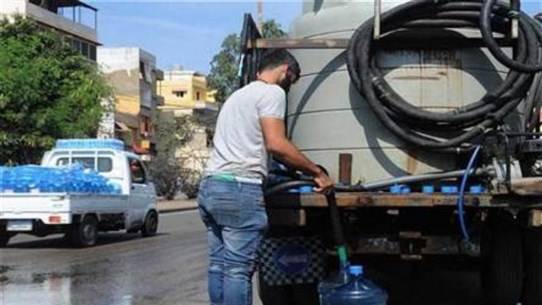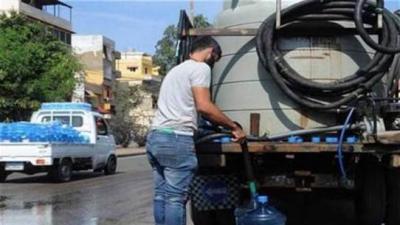The cholera outbreak occupies the minds of Lebanese citizens amid a water shortage crisis that has worsened in all regions due to power outages. State-run water stations rely on turbines powered by electricity to supply drinking water and irrigation. The lack of water has forced citizens to purchase it through tanker trucks, incurring costs linked to the exchange rate of the US dollar, as the price of diesel fuel is tied to the green currency.
Tanker owners are frequently asked by consumers about the quality and source of the transported water, to which they respond: "You have been our customers for at least two decades; what has changed in the conditions of water supply to justify this barrage of questions?" The fear of a cholera epidemic has prompted people to search for special disinfectants to purify the water. Many discovered that sterilizing tablets like 'Cetranit' have been unavailable in supermarkets and pharmacies for a long time due to their high prices. As a substitute, they began adding chlorine and household cleaners like 'Clorox' and 'Dettol' to water tanks.
However, the main problem remains securing water to prevent the spread of cholera, as the persistent water outage and restrictions on its use create ample opportunities for the disease to spread. Springs owners, who have dug wells at their own expense and extended water networks in several neighborhoods of Amchit and various villages along the coast of Jbeil district and the new suburb of Metn, boast about their efforts.
Rouad Bakhous, owner and partner in a private water pumping station in Amchit, supplies several homes with his spring's fresh water, selling gallons for drinking, which undergo regular laboratory testing. The spring is also located in an area not threatened by wastewater seepage. He notes the high costs of extracting and delivering water to homes due to rising fuel prices, stating that his service has remained unaffected by the most severe circumstances, from the July 2006 war to the economic collapse since 2019.
Many are demanding local municipalities to dig wells and take charge of selling water to residents, ensuring a solution to the water crisis and its quality. However, this is not feasible in many areas, especially in the capital, Beirut, and its suburbs, which rely on water pumped from stations. A few neighborhoods receive water by gravity without needing electricity from the state or private generators powered by diesel.
In this context, citizens are also increasingly concerned about the sources of agricultural products such as vegetables and fruits. They prioritize purchasing crops from areas other than the western Beqaa and Akkar plain to avoid potential contamination from wastewater flowing into the Litani River basin in western Beqaa due to Syrian refugee camps, as well as in villages located in Akkar plain where the epidemic has spread significantly, resulting in several deaths.
Big stores selling vegetables and fruits have put up signs indicating the source of their goods. It should be noted that washing vegetables and fruits with disinfectants remains the best guarantee against cholera and other epidemics. A new epidemic and great fear persist due to the inability of Lebanese government authorities and the private sector to counteract the rising costs that are foundational to the response.
Once again, the Lebanese citizen finds themselves alone in the field, with no option but to confront the issue head-on.




